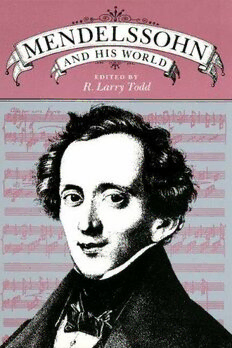
Mendelssohn and His World PDF
Preview Mendelssohn and His World
Mendelssohn and His World K O O R. Larry Todd B - E S S E R P Y T I S R E V I N U N O T E C N I R P A MENDELSSOHN AND HIS WORLD Copyright © 1991 by Princeton University Press Published by Princeton University Press, 41 William Street, Princeton, New Jersey 08540 In the United Kingdom: Princeton University Press, Chichester, West Sussex ALL RIGHTS RESERVED Library of Congress Cataloging-in-Publication Data Mendelssohn and his world / edited by R. Larry Todd, p. cm. Includes bibliographical references and index. ISBN 0-691-09143-9 (CL) — ISBN 0-691-02715-3 (PB) 1. Mendelssohn-Bartholdy, Felix, 1809-1847. I. Todd, R. Larry. ML410.M5M47 1991 780'.92—dc2o [B] 91-16124 This book has been composed in Linotron Baskerville Princeton University Press books are printed on acid-free paper and meet the guidelines for permanence and durability of the Committee on Production Guidelines for Book Longevity of the Council on Library Resources Printed in the United States of America 10 9 8 7 6 5 4 32 Designed by Laury A. Egan Contents Preface ix Acknowledgments xiii PART I ESSAYS The Aesthetics of Assimilation and Affirmation: Reconstructing the Career of Felix Mendelssohn LEON BOTSTEIN 5 Some Notes on an Anthem by Mendelssohn DAVID BRODBECK 43 Mendelssohn and the Berlin Singakademie: The Composer at the Crossroads WM. A. LITTLE 65 The Power of Class: Fanny Hensel NANCY B. REICH 86 Samplings CLAUDIO SPIES 100 Elijah, Johann Sebastian Bach, and the New Covenant: On the Aria "Es ist genug" in Felix Mendelssohn- Bartholdy's Oratorio Elijah MARTIN STAEHELIN TRANSLATED BY SUSAN GILLESPIE 121 The Incidental Politics to Mendelssohn's Antigone MICHAEL P. STEINBERG 137 The Unfinished Mendelssohn R. LARRY TODD 158 PART II MEMOIRS Conversations with Felix Mendelssohn JOHANN CHRISTIAN LOBE 187 TRANSLATED BY SUSAN GILLESPI E • V • CONTENTS From the Memoirs of Adolf Bernhard Marx TRANSLATED BV SUSAN GILLESPIE 206 Reminiscences of Felix Mendelssohn-Bartholdy JULIUS SCHUBRING 221 Reminiscences of Mendelssohn by His English Pupil CHARLES EDWARD HORSLEY 237 From the Memoirs of F. Max Muller 252 From the Memoirs of Ernst Rudorff TRANSLATED AND ANNOTATED BY NANC Y B. REICH 259 PART III LETTERS Letters from Felix Mendelssohn-Bartholdy to Aloys Fuchs EDUARD HANSLICK TRANSLATED BY SUSAN GILLESPIE 275 Mendelssohn as Teacher, with Previously Unpublished Letters from Mendelssohn to Wilhelm v. Boguslawski BRUNO HAKE TRANSLATED BY SUSAN GILLESPIE 3IO PART IV CRITICISM AND RECEPTION Robert Schumann with Reference to Mendelssohn- Bartholdy and the Development of Modern Music in General FRANZ BRENDEL TRANSLATED BY SUSAN GILLESPIE 34I Heinrich Heine on Mendelssohn SELECTED AND INTRODUCED BY LEON BOTSTEIN TRANSLATED BY SUSAN GILLESPIE 352 On F. Mendelssohn-Bartholdy's Oratorio Elijah OTTO JAHN TRANSLATED BY SUSAN GILLESPIE 364 On Mendelssohn and Some of His Contemporary Critics FRIEDRICH NIECKS 382 • vi • CONTENTS Felix Mendelssohn HANS VON BÜLOW TRANSLATED BY SUSAN GILLESPIE Index of Names and Compositions 395 List of Contributors 403 vii Preface To speak of a twentieth-century Mendelssohn revival, Carl Dahlhaus observed as recently as 1974, would be a gross exaggeration.' At that time, Mendelssohn was still chiefly remembered as the youthful com- poser of the Octet and the Midsummer Night's Dream Overture, as a facile genius whose art neither plumbed the profound depths of Bee- thoven's music nor adequately anticipated the mythic-poetic dimen- sions of Wagner's music dramas. As we approach the 150th anniver- sary of Mendelssohn's death (1997), the broader view continues to encourage fresh reassessments of the composer's reception: to dis- miss much of his music as superficial, as overly sentimental, is actually to reinforce and perpetuate a tangled part of the Mendelssohn criti- cal reception that became established largely in the latter part of the nineteenth century and entrenched in the first part of the twentieth. In 1850, of course, Richard Wagner had launched a scurrilous anti-Semitic attack on Mendelssohn in his "Das Judenthum i n der Musik," which first appeared anonymously in the pages of the Neue Zeitschrift für Musik, the journal founded in 1834 and edited, until 1845, by Mendelssohn's friend and staunch admirer, Robert Schu- mann. By 1875, Friedrich Niecks took up his pen to defend Men- delssohn's music; but while he extolled the composer's elevation and mastery of the fanciful as an aesthetic category, Niecks had to admit that "the serene beauty of Mendelssohn's music ha s to most of us not the same charm as the rugged energy, th e subtle thoughtfulness and morbid world-weariness of other composers."® During the 1880s , in a reaction against Victorian mores, George Bernard Shaw decried Mendelssohn's "kid-glove gentility, his conventional sentimentality, and his despicable oratorio mongering."3 And, of course, Mendels- sohn's place in history suffered a final blow during the 1930s, when the Nazis destroyed his statue in Leipzig and banned his music. 4 This decline in Mendelssohn's stature contrasted sharply with the esteem he actually enjoyed during his lifetime. Indeed, during the 1830s and 1840s Mendelssohn arguably stood at the forefront of mu- sical culture in Germany and England. What is more, after his death in 1847 at the age of thirty-eight, his memory was celebrated by a kind of hero worship that expressed itself probabl y most ardently in IX
